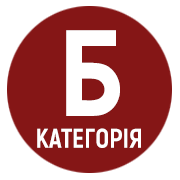RESEARCH OF TEACHERS 'READINESS TO WORK IN INCLUSIVE EDUCATION AND WAYS OF FORMING THEIR INCLUSIVE COMPETENCE
DOI:
https://doi.org/10.32782/2410-2075-2022-15.3Keywords:
inclusive competence, teacher's willingness to work in an inclusive educational environment, children with special educational needs, teacher training, coaching,Abstract
Introduction. An inclusive educational environment needs to be built in our country.The Teacher Professional Standard defines inclusive competence as one of the professional competences. The issue of teachers' readiness to work in an inclusive educational environment is relevant. Purpose. To determine the state of teachers’ readiness to work in an inclusive educational environment and ways to develop teachers’ inclusive competence in the system of postgraduate education. Methods. Analysis and systematization of information, questionnaires, methods of mathematical processing of questionnaire results. Results. Teacher's readiness to work with children with special educational needs: psychological and professional readiness. To determine the level of readiness of teachers to work in an inclusive educational environment, we conducted a survey among teachers of Dnipro and Dnipropetrovsk region. The study involved 56 teachers of natural sciences who did not take advanced training courses on inclusive education. The survey was conducted using the Google Forms service. The main purpose of teaching children with special educational needs, teachers believe to provide them with equal opportunities for education, increase their socialization, equality of communication among peers, society's acceptance of their characteristics. Teachers find it useful to have a child with special educational needs in a regular classroom not only for the child but also for his or her classmates. Among the qualities that a teacher must have to work with children with special educational needs, teachers identified acceptance of the child's characteristics, patience, empathy, love for children, developed organizational and communicative skills, ability to work in a team. The results of self-assessment of the level of teachers' skills in working in an inclusive educational environment showed that 13 teachers rated their level on 2 points – 23.2%, on 3 points – 8 teachers – 14.3%, on 4 points – 5 teachers – 8.9%, 5 points – 19 teachers – 33.9%, 6 points – 11 teachers – 19.6%. At 7 or more points no teacher evaluated their skills. The results of self-assessment of the level of readiness of teachers to work in an inclusive educational environment showed that 1 teacher rated his level in 1 point – 1.8%, 2 points – 15 teachers – 26.8%, 3 points – 17 teachers – 30.4 %, 4 points – 19 teachers – 33.4%, 5 points – 4 teachers – 7.1%. Originality. Teachers of the study group do not have a sufficiently developed readiness to work with children with special educational needs in an inclusive educational environment. The results of the research are the basis for finding new forms, methods and technologies that can be used in organizing teacher training and organizing the team of psychological and pedagogical support of children with special educational needs in the educational institution. Conclusion. To develop teachers' readiness to work in an inclusive education, coaching can be used as an effective technology for personal and professional growth, and coaching exercises can be used as tools to identify the causes of lack of readiness in an inclusive education environment. Prospects for further research see the need for a more detailed study of the readiness of teachers to work in an inclusive educational environment for all identified components of readiness, in the development of pedagogical conditions and models for inclusive teacher competence in postgraduate education and experimental testing of pedagogical conditions and models.
References
Кауфман С. За межами піраміди потреб. Новий погляд на самореалізацію / Пер. з англ. Київ : Лабораторія, 2021. 400 с.
Коврігіна Л. М. Формування готовності вчителя до роботи з дітьми з особливими освітніми потребами в умовах інклюзивного навчання. Освіта та розвиток обдарованої особистості. 2017. № 11. С. 10–16. URL: http://nbuv.gov.ua/UJRN/Otros_2017_11_4 (дата звернення: 10.05.2022).
Кудрик Л., Бешлей А., Мельник У. Самокоучинг. Як запобігти професійному вигоранню. Київ, 2019. 216 с.
Малишевська І. А. Теоретико-методичні основи підготовки фахівців психолого-педагогічного профілю до роботи в умовах інклюзивного освітнього середовища : дис. ... док. пед. наук : 13.00.03 корекційна педагогіка. Київ, 2018. 523 с. URL: http://ispukr.org.ua/articles/18/18121102_d.pdf (дата звернення: 10.05.2022).
Освіта в Україні: виклики та перспективи. Інформаційно-аналітичний збірник. Київ, 2020. 293 с. URL: https://mon.gov.ua/storage/app/media/zagalna%20serednya/serpneva-konferencia/2020/ metod-zbirka-osvita-ta-covid-2020.pdf
Отич О. М. Освіта дорослих у суспільстві знань. Професійний розвиток фахівців у системі освіти дорослих: історія, теорія, технології : збірник матеріалів ІІ Всеукраїнської Інтернет-конференції (м. Київ, 28 квіт. 2017 р.). Київ, 2017. 424 с.
Петренко О. Педагогічний коучинг у діяльності вчителя в контексті реалізації концепції «Нова українська школа». Нова педагогічна думка. 2018. № 1 (93). С. 62–66.
Професійний стандарт за професіями «Вчитель початкових класів закладу загальної середньої освіти», «Вчитель закладу загальної середньої освіти», «Вчитель з початкової освіти (з дипломом молодшого спеціаліста)», затверджений наказом Міністерства розвитку економіки, торгівлі та сільського господарства України від 23 грудня 2020 р. № 2736. URL: https://www.me.gov.ua/Documents/Detail?lang=uk-UA&id=22469103-4e36- 4d41-b1bf-288338b3c7fa&title=RestrProfesiinikhStandartiv) (дата звернення: 10.05.2022).
Савчук Л. Компетентісний підхід у підвищенні кваліфікації педагогів до запровадження інклюзивної моделі навчання дітей з особливими освітніми потребами. Нова педагогічна думка. 2010. № 1. С. 98−101.
Шевців З. М. Теорія і методика професійної підготовки майбутніх учителів початкової школи до роботи в інклюзивному середовищі загальноосвітнього навчального закладу : дис. ... док. пед. наук : 13.00.04 – теорія і методика професійної освіти. Рівне, 2017. 608 с. URL: http://www.rshu.edu.ua/ images/afto/d_002_2.pdf (дата звернення: 10.05.2022).
Coaching in education: Getting Better Results for Students, Educators, and Parents / edited by Christian van Nieuwerburgh. London, 2012. 245 р.
Coaching Learning Resource. URL: http://www.stepintoleadership.info/assets/pdf/SSSC%20Coaching %20Aug%2016%20master.pdf (дата звернення: 10.05.2022).







